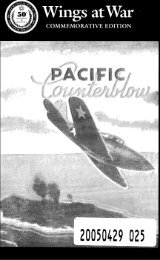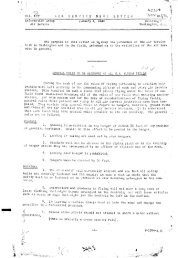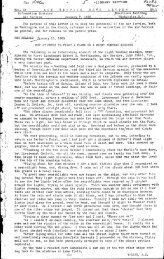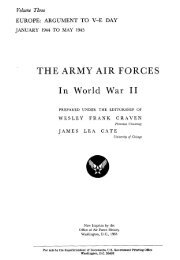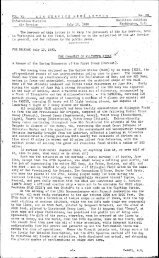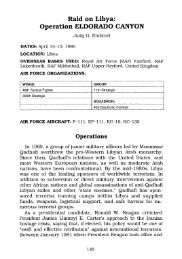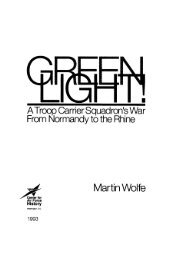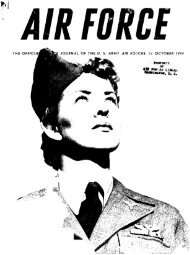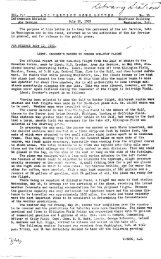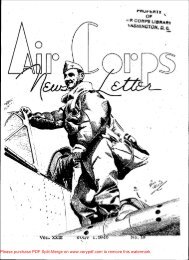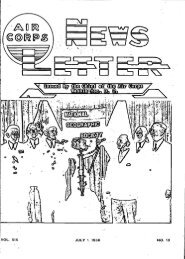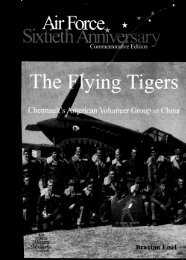A Concise History of the US Air Force - Air Force Historical Studies ...
A Concise History of the US Air Force - Air Force Historical Studies ...
A Concise History of the US Air Force - Air Force Historical Studies ...
You also want an ePaper? Increase the reach of your titles
YUMPU automatically turns print PDFs into web optimized ePapers that Google loves.
grace-strategic bombing directly against <strong>the</strong> vital centers <strong>of</strong> a nation’s<br />
war-making capability.<br />
American airmen came back from France with a unique perspec-<br />
tive on modem war. Josiah Rowe, <strong>of</strong> <strong>the</strong> 147th Aero Squadron, wrote <strong>of</strong><br />
<strong>the</strong> World War I battlefield as “a barren waste, broken only by shell holes,<br />
trenches and barbed wire, with not one living thing in sight.” He was<br />
“glad to get away from such gruesome scenes” by climbing into <strong>the</strong> sky<br />
in his airplane. Billy Mitchell wrote that <strong>the</strong> Allies could cross <strong>the</strong> front<br />
lines “in a few minutes” in <strong>the</strong>ir aircraft, whereas “<strong>the</strong> armies were locked<br />
in <strong>the</strong> struggle, immovable, powerless to advance, for three years . . . . It<br />
looked as though <strong>the</strong> war would go on indefinitely until ei<strong>the</strong>r <strong>the</strong> air-<br />
planes brought [it to an end] or <strong>the</strong> contending nations dropped from<br />
sheer exhaustion.”<br />
American airmen knew that aircraft lacked <strong>the</strong> range, speed, and<br />
reliability for strategic bombing, but <strong>the</strong>y had faith that technology could<br />
overcome any restrictions. They also knew <strong>the</strong> importance <strong>of</strong> concentrat-<br />
ing on basic objectives such as winning air superiority or interdicting <strong>the</strong><br />
front, both <strong>of</strong> which, <strong>the</strong>y believed, required an independent air force.<br />
They had caught tantalizing glimpses <strong>of</strong> what strategic bombing could do<br />
to an enemy’s industrial centers. They saw <strong>the</strong> effectiveness <strong>of</strong> <strong>of</strong>fense<br />
and <strong>the</strong> futility <strong>of</strong> defense against a determined aerial assault.<br />
For <strong>the</strong>se and o<strong>the</strong>r servicemen, aircraft seemed <strong>the</strong> answer to <strong>the</strong><br />
slaughter <strong>of</strong> trench warfare. German airmen soon envisioned air power as<br />
mobile artillery accompanying fast-moving armored units (blitzkrieg<br />
warfare). American airmen, however, saw air power as an independent<br />
strategic force that could bring an enemy nation to its knees. Throughout<br />
history, an attacking army fought its way through a defending army to get<br />
to its enemy’s vital centers. Strategic bombers would fly over <strong>the</strong> army to<br />
strike at <strong>the</strong> enemy’s heart. <strong>Air</strong> leaders such as Billy Mitchell believed<br />
that with aircraft future wars would be shorter and less bloody.<br />
During World War I America’s air force had not coalesced.<br />
Afterwards it had to be built in an atmosphere <strong>of</strong> antiwar fervor and con-<br />
gressional stinginess. In addition, <strong>the</strong> U.S. Army and U.S. Navy, viewing<br />
<strong>the</strong> air force as <strong>the</strong>ir auxiliary arms and a supporting weapon, placed<br />
obstacles in <strong>the</strong> way <strong>of</strong> its fur<strong>the</strong>r development. The President’s <strong>Air</strong>craft<br />
Board, better known as <strong>the</strong> Morrow Board for its chairman, <strong>the</strong> banker<br />
Dwight Morrow, called by President Calvin Coolidge in 1925 to evaluate<br />
<strong>the</strong> <strong>Air</strong> Service’s call for independence, reinforced this view: “The next<br />
war may well start in <strong>the</strong> air but in all probability will wind up, as <strong>the</strong> last<br />
war did, in <strong>the</strong> mud.” Evolving technology and irrepressible flyers, how-<br />
ever, drove <strong>the</strong> <strong>Air</strong> Service in a different direction.<br />
12





